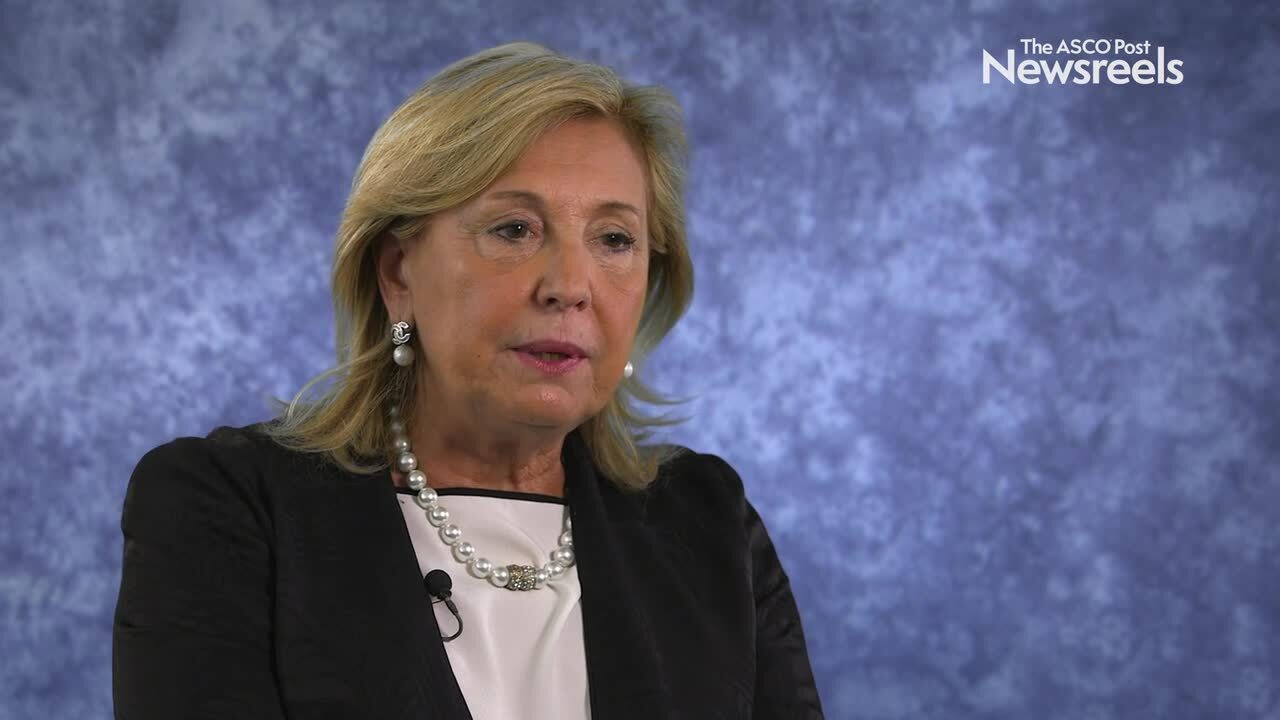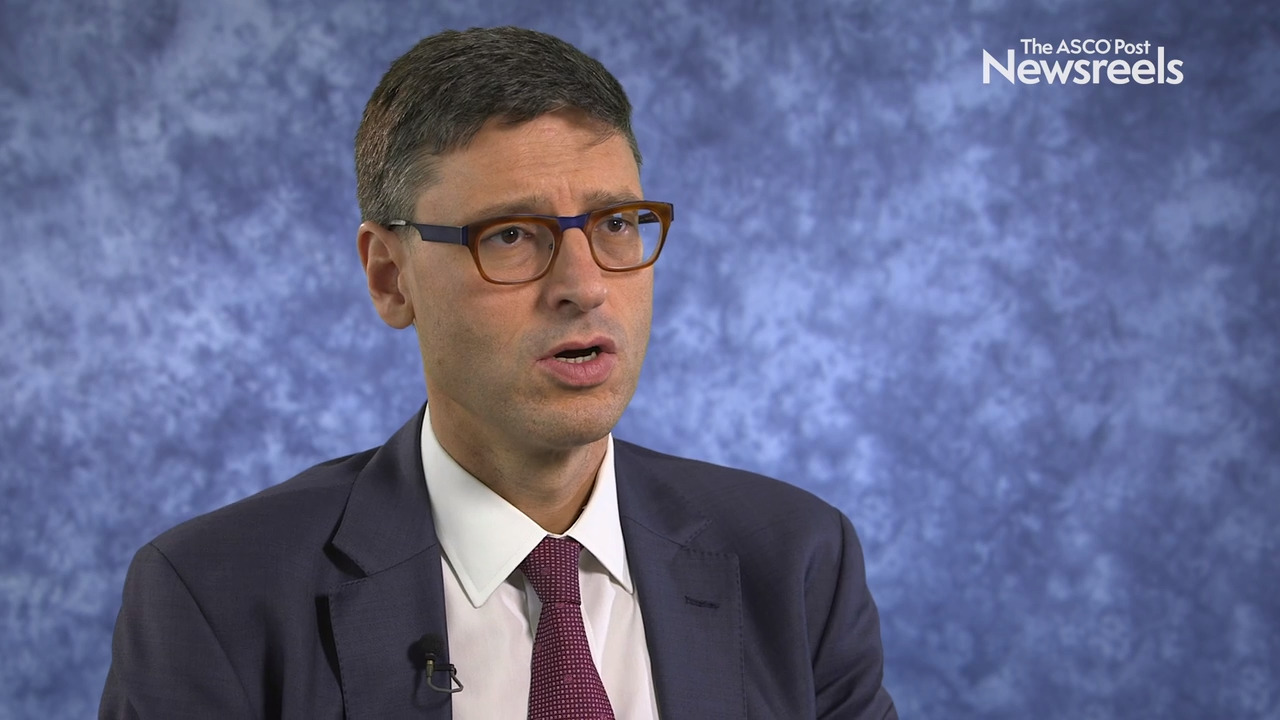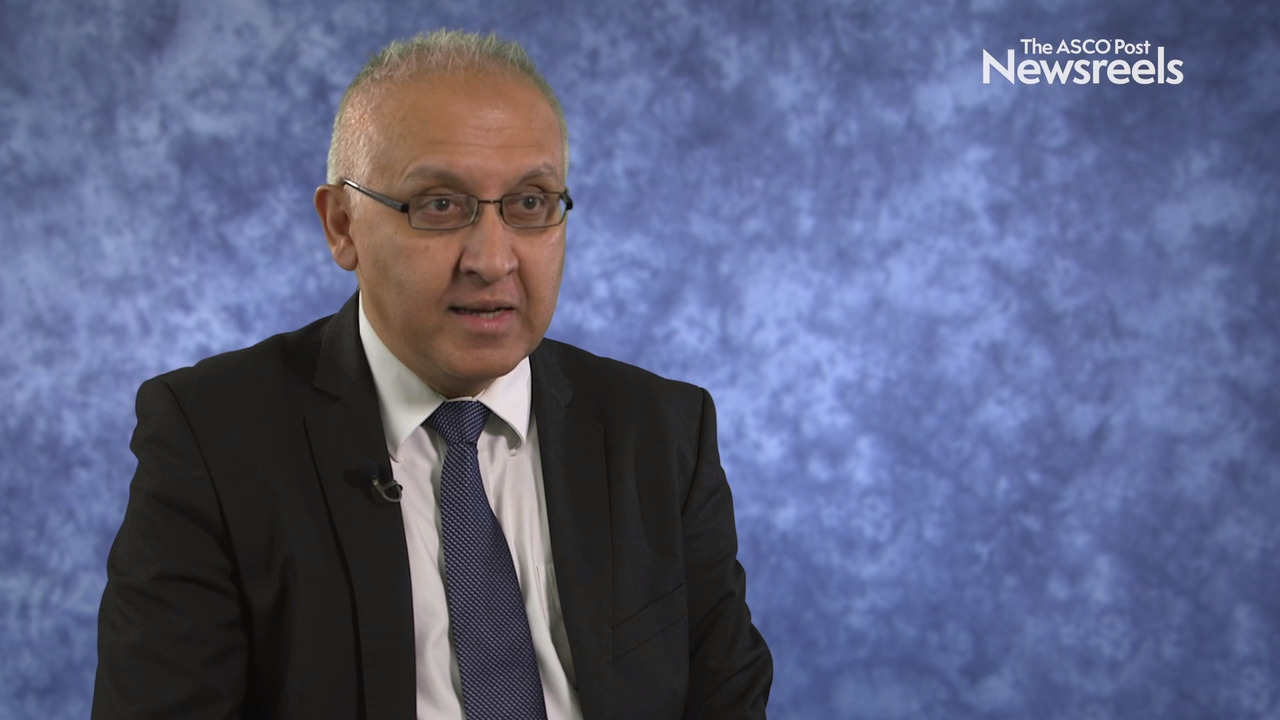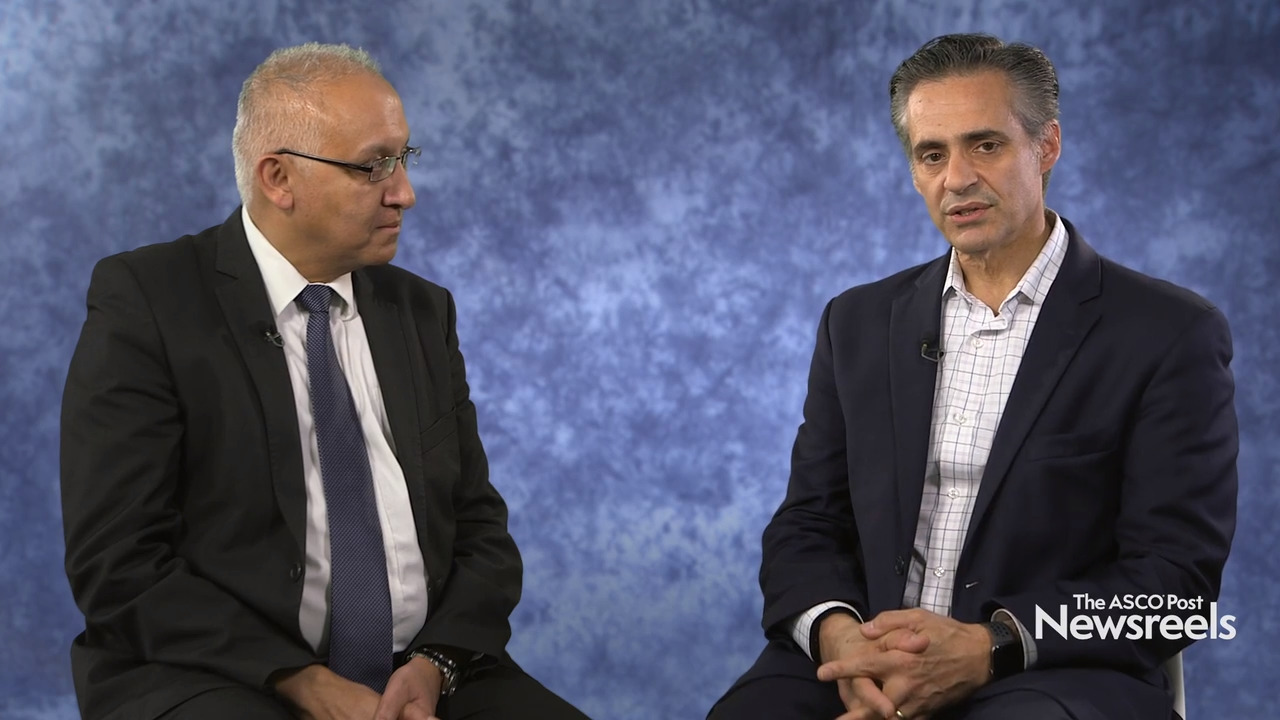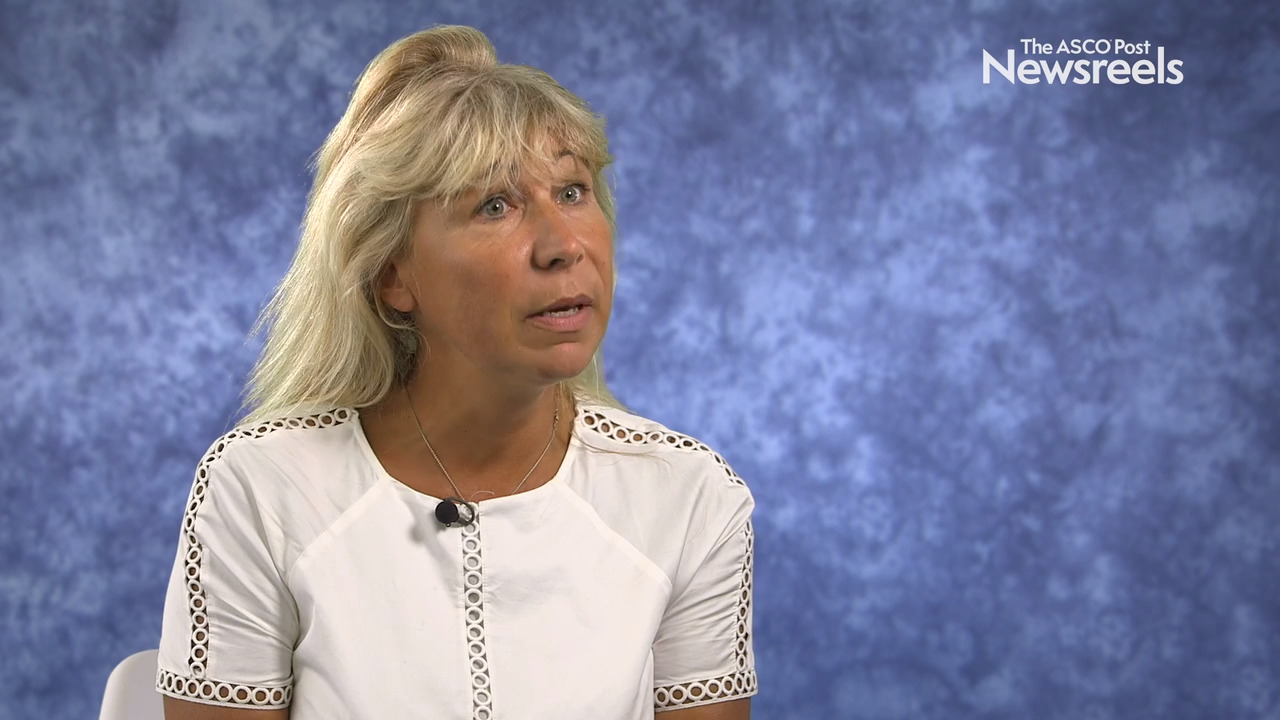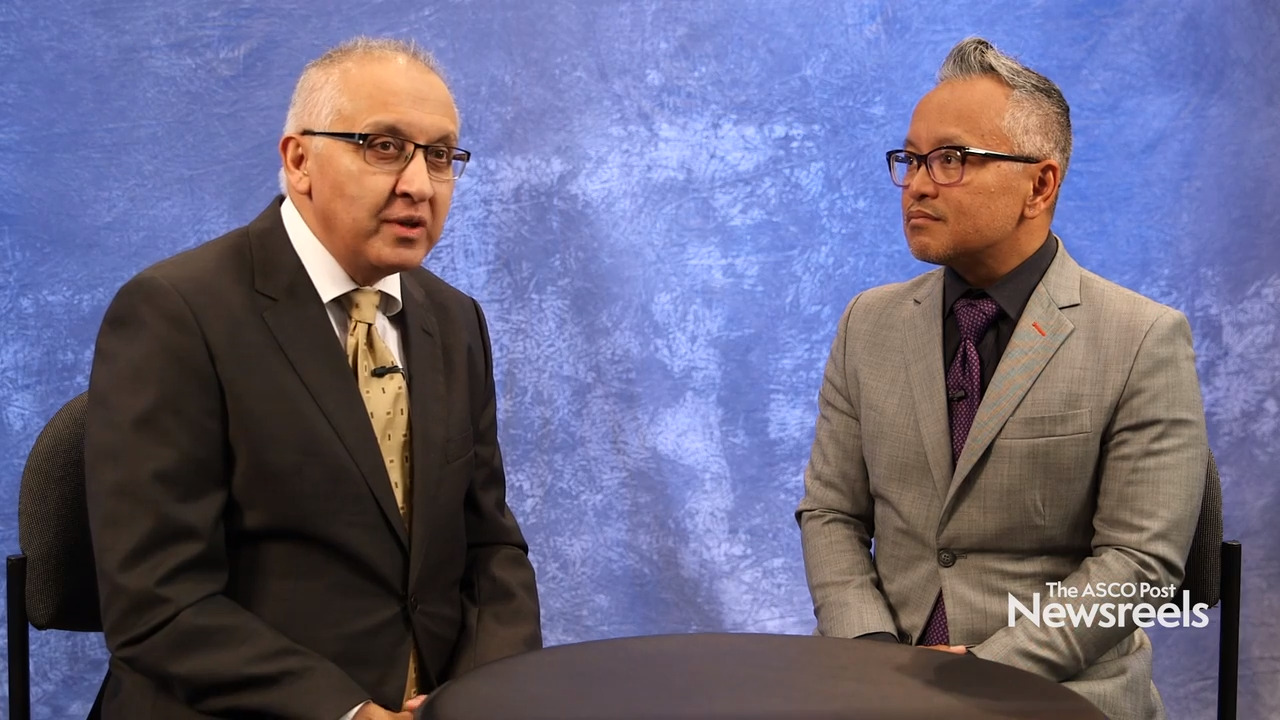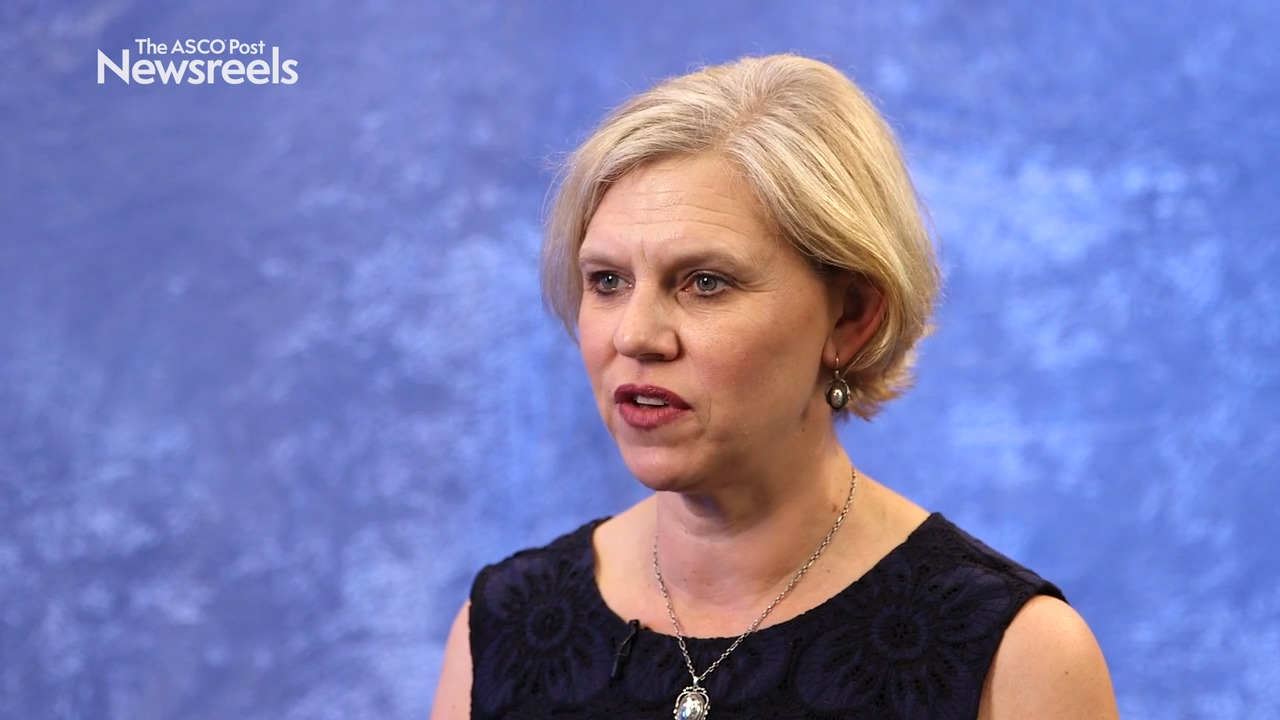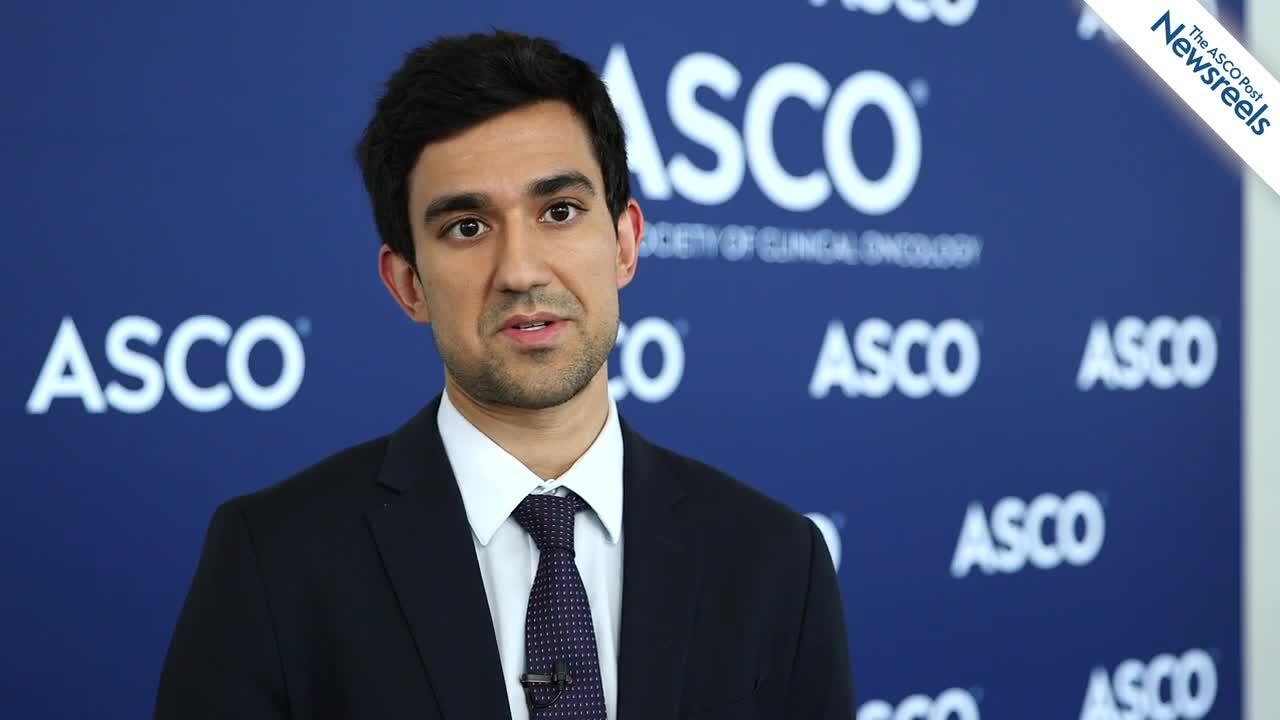Nicoletta Colombo, MD, on Lenvatinib/Pembrolizumab for Advanced Endometrial Cancer
Nicoletta Colombo, MD, of Istituto Europeo di Oncologia, discusses the efficacy of lenvatinib/pembrolizumab in metastatic endometrial cancer. The combination showed antitumor activity, regardless of tumor microsatellite instability or DNA mismatch repair status (Abstract 994O).
Antonio González Martín, MD, PhD, on Ovarian Cancer: PRIMA/ENGOT-OV26/GOG-3012 Trial of Niraparib
Antonio González Martín, MD, PhD, of the Clínica Universidad de Navarra, discusses study findings showing niraparib therapy significantly improved progression-free survival in patients with advanced ovarian cancer across biomarker subgroups (Abstract LBA1).
Mansoor R. Mirza, MD, on Ovarian Cancer: Roundup of ESMO 2019 Top Abstracts
Mansoor R. Mirza, MD, of Copenhagen University Hospital, offers his perspective on three studies presented in the Presidential Symposium: the PRIMA/ENGOT-OV26/ GOG-3012 trial (niraparib for newly diagnosed advanced disease); the PAOLA-1/ENGOT-ov25 trial (olaparib plus bevacizumab maintenance therapy in newly diagnosed advanced disease); and the VELIA/COG-3005 study (integrating veliparib with front-line chemotherapy and maintenance therapy) (Abstracts LBA 1–4).
Mansoor R. Mirza, MD, and Robert L. Coleman, MD, on Integrating Velaparib With Chemotherapy and Maintenance Therapy in Gynecologic Cancers
Mansoor R. Mirza, MD, of Copenhagen University Hospital, and Robert L. Coleman, MD, of The University of Texas MD Anderson Cancer Center, discuss phase III study findings, which showed that by adding veliparib to front-line carboplatin and paclitaxel and continuing it as monotherapy maintenance, the PARP inhibitor extended progression-free survival in women with newly diagnosed high-grade serous carcinoma of the ovaries or fallopian tubes or tumors of primary peritoneal origin (Abstract LBA3).
Isabelle Ray-Coquard, MD, PhD, on Ovarian Cancer: Olaparib Plus Bevacizumab
Isabelle Laure Ray-Coquard, MD, PhD, of the Centre Leon Bérard, discusses phase III study findings in patients with newly diagnosed, advanced ovarian cancer who received olaparib plus first-line bevacizumab maintenance treatment. Compared with placebo plus bevacizumab, olaparib improved progression-free survival, with the greatest benefit in women with BRCA mutations and positive homologous recombination deficiency status (Abstract LBA2).
ESMO 2019: Studies Show PARP Inhibitors Improve Survival, Reduce Risk of Disease Recurrence or Death in Newly Diagnosed Ovarian Cancer
Two studies presented at the European Society for Medical Oncology (ESMO) 2019 Congress showed the efficacy of poly ADP ribose polymerase (PARP) inhibitors in patients with newly diagnosed ovarian cancer. In the PRIMA/ENGOT-OV26/GOG-3012 study, presented by González Martín et al (Abstract LBA1;...
Origin and Taxonomy of Mucinous Ovarian Cancer
An international study has revealed the origin of mucinous ovarian cancer, confirming that unlike other types of ovarian cancer, this cancer arises from benign and borderline precursors at the ovaries and are not extraovarian metastases. These findings were published by Cheasley et al in Nature...
Immunotherapy for Recurrent or Metastatic Cervical, Vaginal, or Vulvar Carcinoma
As reported in the Journal of Clinical Oncology by Naumann et al, the phase I/II CheckMate 358 trial found that nivolumab showed activity in a cohort of patients with recurrent or metastatic cervical, vaginal, or vulvar squamous cell carcinoma. Study Details A total of 24 patients were enrolled...
FDA Grants Approval to Lenvatinib/Pembrolizumab in Advanced Endometrial Cancer, Announces Project Orbis
The U.S. Food and Drug Administration (FDA) has announced Project Orbis, an initiative of the FDA Oncology Center of Excellence (OCE). Project Orbis provides a framework for concurrent submission and review of oncology drugs among its international partners. Under this project, the FDA, the...
Bevacizumab/Niraparib vs Niraparib Alone for Platinum-Sensitive Recurrent Ovarian Cancer
In the phase II NSGO-AVANOVA2/ENGOT-ov24 trial reported in The Lancet Oncology, Mansoor Raza Mirza, MD, and colleagues found that the combination of bevacizumab plus niraparib prolonged progression-free survival vs niraparib alone in women with platinum-sensitive recurrent ovarian cancer. Study...
ASTRO 2019: Effect of Closure of Women’s Health Clinics From 2010 to 2013 on Cervical Cancer Screening and Detection
Following the closure of nearly 100 women’s health clinics across the United States from 2010 to 2013, fewer women were screened for cervical cancer; more women were diagnosed with advanced stages of the disease; and disease mortality rates rose. Findings from a new analysis combining several...
Neoadjuvant Cisplatin/Gemcitabine Followed by Standard Chemoradiation in Locally Advanced Cervical Cancer
In a Brazilian single-center phase II trial reported in the Journal of Clinical Oncology, da Costa et al found that neoadjuvant cisplatin/gemcitabine followed by standard chemoradiation therapy with cisplatin did not improve outcomes vs chemoradiation therapy alone in locally advanced cervical...
USPSTF Recommendation on Risk Assessment, Genetic Counseling, and Genetic Testing for BRCA-Related Cancer
As reported in JAMA, the U.S. Preventive Services Task Force (USPSTF) recommended risk assessment and, if indicated, genetic counseling and testing for potentially harmful BRCA1/2 mutations in women with a personal or family history of breast, ovarian, tubal, or peritoneal cancer or who have...
2019 Quality Care: Improving Caregiver Identification and Support in a Gynecologic Oncology Practice
In a study reported at the ASCO Quality Care Symposium and simultaneously published in the Journal of Oncology Practice, Campbell et al found that an ASCO Quality Training Program Project—the Plan-Do-Study-Act (PDSA) initiative—resulted in improvement in primary caregiver identification and...
Avelumab for Mismatch Repair–Deficient and Mismatch Repair–Proficient Endometrial Cancer
In a phase II trial reported in the Journal of Clinical Oncology, Panagiotis A. Konstantinopoulos, MD, PhD, and colleagues found evidence of promising activity of the programmed cell death ligand 1 (PD-L1) inhibitor avelumab in mismatch repair–deficient (MMRD) recurrent or persistent endometrial...
Does PTSD Increase the Risk of Developing Ovarian Cancer?
Women who experienced six or more symptoms of posttraumatic stress disorder (PTSD) at some point in life had a twofold greater risk of developing ovarian cancer compared with women who never experienced any PTSD symptoms. These findings were published by Roberts et al in Cancer Research. The...
Adjuvant Chemoradiotherapy vs Radiotherapy Alone in High-Risk Endometrial Cancer
As reported in The Lancet Oncology by Stephanie de Boer, MD, and colleagues, a post hoc updated survival analysis of the phase III PORTEC-3 trial has shown a significant overall survival benefit of adjuvant chemoradiotherapy vs radiotherapy alone in women with high-risk endometrial cancer. A...
FDA Approves Bevacizumab Biosimilar for Five Cancer Types
ON JUNE 28, the U.S. Food and Drug Administration (FDA) approved bevacizumab-bvzr (Zirabev), a biosimilar to bevacizumab (Avastin), for the treatment of five types of cancer: metastatic colorectal cancer; unresectable, locally advanced, recurrent, or metastatic nonsquamous non–small cell lung...
Addition of Antiangiogenic Agent to First-Line Carboplatin/Paclitaxel in Ovarian Cancer
In a phase III trial (TRINOVA-3/ENGOT-ov2/GOG- 3001) reported in The Lancet Oncology, Ignace Vergote, PhD, and colleagues found that addition of the antiangiogenic agent trebananib to carboplatin/ paclitaxel did not improve progression-free survival in first-line treatment of advanced ovarian...
Mansoor Raza Mirza, MD, and Don S. Dizon, MD, on Recurrent Platinum-Sensitive Ovarian Cancer: Niraparib Plus Bevacizumab
Don S. Dizon, MD, of the Lifespan Cancer Institute, and Mansoor Raza Mirza, MD, of Copenhagen University Hospital, discuss study findings that showed, compared with niraparib alone, niraparib plus bevacizumab improved progression-free survival in women with recurrent platinum-sensitive ovarian cancer (Abstract 5505).
Matthew A. Powell, MD, and Don S. Dizon, MD, on Uterine or Ovarian Cancer: Paclitaxel Plus Carboplatin vs Ifosfamide in Chemotherapy-Naive Patients
Don S. Dizon, MD, of the Lifespan Cancer Institute, and Matthew A. Powell, MD, of Washington University School of Medicine, discuss phase III findings on paclitaxel plus carboplatin vs paclitaxel plus ifosfamide in chemotherapy-naive patients with stages I to IV, persistent or recurrent carcinosarcoma of the uterus or ovaries (Abstract 5500).
Aspirin Use and Cancer Prevention: Long-Term Data Needed on Benefits and Risks
In addition to its well-known cardioprotective benefits, aspirin has a substantial body of observational, preclinical, and clinical evidence supporting its efficacy in preventing cancer, most strongly for colorectal cancer.1 The strength of this evidence led the U.S. Preventive Services Task...
Regular Aspirin Use and Risk of Hepatocellular Carcinoma and Epithelial Ovarian Cancer
Data from two large U.S. prospective cohort studies indicate the benefits of regular aspirin use in preventing hepatocellular carcinoma and epithelial ovarian cancer. As reported by Tracey G. Simon, MD, MPH, of Massachusetts General Hospital, Harvard Medical School, and colleagues, in JAMA...
Panagiotis A. Konstantinopoulos, MD, PhD, on Endometrial Cancer: Avelumab in Microsatellite-Stable and -Instable Disease
Panagiotis A. Konstantinopoulos, MD, PhD, of Dana-Farber Cancer Institute, discusses his phase II study on the response to avelumab in microsatellite-stable and -instable recurrent or persistent endometrial cancer with a polymerase epsilon mutation (Abstract 5502).
Richard T. Penson, MD, and Don S. Dizon, MD, on Ovarian Cancer: SOLO3 Trial on Olaparib vs Chemotherapy in Relapsed Disease
Don S. Dizon, MD, of the Lifespan Cancer Institute, and Richard T. Penson, MD, of Massachusetts General Hospital Cancer Center, discuss phase III study findings on the PARP inhibitor olaparib, which showed a significantly higher objective response rate vs nonplatinum chemotherapy for patients with ovarian cancer who relapsed, are platinum-sensitive, and have BRCA-mutant disease (Abstract 5506).
Yoland C. Antill, MD, on Endometrial Cancer: PHAEDRA Trial on Durvalumab and Mismatch Repair Status
Yoland C. Antill, MD, of Cabrini Health, discusses phase II data on the effect of durvalumab, a PD-L1 inhibitor, as a single agent in the setting of recurrent or advanced endometrial cancer. Her research compares the response in mismatch repair–deficient and –proficient tumors (Abstract 5501).
Kamran A. Ahmed, MD, on Cervical Cancer: Stereotactic Body Radiation Therapy Plus Atezolizumab
Kamran A. Ahmed, MD, of the H. Lee Moffitt Cancer Center and Research Institute, reports on a trial in progress that is investigating whether treatment with atezolizumab plus hypofractionated radiation therapy will improve the objective response rate compared with atezolizumab alone in patients with recurrent, persistent, or metastatic cervical cancer (Abstract TPS5596).
Barriers to Cervical Cancer Screening Among HIV-Infected Women in Tanzania
Population screening programs and the advent of human papillomavirus (HPV) vaccination have made cervical cancer largely a preventable disease. Despite these advances, cervical cancer remains a leading cause of cancer death for women in low- and middle-income countries. A recent study identified...
Modeling Projections of Global Cervical Cancer Control
In a modeling study reported in The Lancet Oncology, Karen Canfell, DPhil, and colleagues detailed the preventive effects on cervical cancer that could be achieved by scaled-up human papillomavirus (HPV) vaccination and cervical screening efforts with the aim of disease elimination. The major...
Effect of Lymphadenectomy on Progression-Free and Overall Survival in Advanced Ovarian Cancer
In the international phase III LION study reported in The New England Journal of Medicine, Philipp Harter, MD, and colleagues found that lymphadenectomy did not improve progression-free or overall survival vs no lymphadenectomy in women with advanced ovarian cancer. Study Details The trial...
Conservatively Managing Ovarian Tumors
In an interim analysis of a prospective cohort study (IOTA5) reported in The Lancet Oncology, Wouter Froyman, MD, and colleagues found that the risk of malignancy and acute complications is low when adnexal masses with benign ultrasound findings are managed conservatively. In the study, patients...
Welcome Questions About Cervical Cancer Treatment Options
TWO STUDIES reported in The New England Journal of Medicine1,2 showed that patients with early-stage cervical cancer had reduced disease-free and overall survival when treated with minimally invasive radical hysterectomy vs open or radical hysterectomy. The findings of these studies have been...
Comparing Survival Outcomes With Minimally Invasive and Open Surgical Approaches to Early-Stage Cervical Cancer
MINIMALLY INVASIVE radical hysterectomy for women with early-stage cervical cancer has been associated with reduced rates of disease-free and overall survival in the phase III LACC randomized noninferiority trial comparing minimally invasive and open abdominal radical hysterectomy. The results...
Minimally Invasive vs Open Abdominal Radical Hysterectomy in Early-Stage Cervical Cancer
TWO STUDIES recently reported in The New England Journal of Medicine indicate that minimally invasive radical hysterectomy is associated with poorer survival outcomes than open abdominal radical hysterectomy in women with early-stage cervical cancer. As reported by Pedro T. Ramirez, MD, of The...
Study Identifies Suitable Partner for Bevacizumab in Recurrent Ovarian Cancer
For patients with recurrent ovarian cancer who receive platinum-based retreatment, the more suitable partner for bevacizumab (Avastin) may be carboplatin plus pegylated liposomal doxorubicin, rather than carboplatin and gemcitabine, according to the results of a phase III ENGOT/GCIG Intergroup...
Expert Point of View: Jonathan Ledermann, MD, and Clara MacKay
“A KEY AIM of treatment is the need to focus on preventing recurrence, which happens in 70% of patients. Over the past 20 years, we have made few inroads in preventing recurrence. This study brings a poly (ADP-ribose) polymerase (PARP) inhibitor olaparib (Lynparza) to the first-line setting,...
Results Reported for Olaparib Maintenance in Ovarian Cancer
TWO-YEAR MAINTENANCE therapy with olaparib (Lynparza), a poly (ADP-ribose) polymerase inhibitor, achieved a significant improvement in progression-free survival in patients with newly diagnosed advanced ovarian cancer and a BRCA1 or BRCA2 mutation, according to results of the phase III SOLO-1...
Niraparib Maintenance Therapy in Recurrent Ovarian Cancer
In a study reported in The Lancet Oncology, Amit M. Oza, MD, of the Princess Margaret Cancer Centre, University Health Network, Toronto, and colleagues found that quality of life based on patient-reported outcomes was not worsened with niraparib (Zejula) maintenance vs placebo in the phase III...
Analgesics and Ovarian Cancer Survival
In a prospective cohort study reported in The Lancet Oncology, Melissa A. Merritt, PhD, of the University of Hawaii Cancer Center’s Epidemiology Program, and colleagues found evidence that recent use of aspirin or nonaspirin nonsteroidal anti-inflammatory drugs (NSAIDs) after diagnosis appears to...
Rucaparib for Maintenance Treatment of Recurrent Ovarian, Fallopian Tube, or Primary Peritoneal Cancer
IN APRIL 2018, the poly (ADP-ribose) polymerase (PARP) inhibitor rucaparib (Rubraca) was granted approval for maintenance treatment of patients with recurrent epithelial ovarian, fallopian tube, or primary peritoneal cancer who are in complete or partial response to platinum-based chemotherapy.1,2...
Actively Recruiting Clinical Trials Focused on Gynecologic Cancers
The information contained in this Clinical Trials Resource Guide includes actively recruiting clinical studies focused on gynecologic cancers—cervical, vaginal, uterine, ovarian, and vulvar cancers. These trials are studying chemoradiotherapy combination treatments, cancer vaccines, intraperitoneal ...
Pembrolizumab for Advanced Cervical Cancer Progressing During or After Chemotherapy
In June 2018, pembrolizumab (Keytruda) was approved for the treatment of patients with recurrent or metastatic cervical cancer with disease progression on or after chemotherapy whose tumors express programmed cell death ligand 1 (PD-L1; combined positive score [CPS] ≥ 1), as determined by a U.S....
NCCN Publishes Guidelines for Gestational Trophoblastic Neoplasia to Optimize Therapy, Preserve Fertility in Pregnant Women With Rare Cancer
THE NATIONAL Comprehensive Cancer Network® (NCCN®) has released new treatment guidelines for a group of rare cancers that impact women during pregnancy. Gestational trophoblastic neoplasia, also known as gestational trophoblastic disease, can occur when tumors develop in the cells that would...
Inaugural Award Recipient Studies Potential of HE4 Blockade as a Novel Immune Therapy in Ovarian Cancer
In 2018, Bristol-Myers Squibb (BMS) provided funds for Conquer Cancer to establish a Young Investigator Award (YIA) supporting female researchers and underscore the importance of gender diversity in oncology practice and research. “We provided this grant as part of our commitment to empowering...
FDA Approves HPV Test for First-Line Cervical Cancer Screening
ON JULY 30, 2018, Roche announced approval by the U.S. Food and Drug Administration (FDA) of its cobas HPV Test in first-line screening for cervical cancer in women 25 years and older using cervical specimens collected in SurePath preservative fluid. The FDA first approved the cobas HPV test...
Long-Term Follow-up of Women With DES-Related Vaginal and Cervical Clear Cell Adenocarcinoma
In a letter to the editor of The New England Journal of Medicine, Dezheng Huo, MD, of the University of Chicago, Chicago, and colleagues described the long-term outcomes of women with vaginal and cervical clear cell adenocarcinoma associated with prenatal exposure to the synthetic nonsteroidal...
Bevacizumab Plus Chemotherapy in Advanced Ovarian Cancer
ON JUNE 13, 2018, bevacizumab (Avastin) was granted approval for treatment of epithelial ovarian, fallopian tube, or primary peritoneal cancer in combination with carboplatin and paclitaxel, followed by single-agent bevacizumab, for stage III or IV disease after initial surgical resection1,2. The...
FDA Approves Bevacizumab in Combination With Chemotherapy for Ovarian Cancer
ON JUNE 13, 2018, the U.S. Food and Drug Administration (FDA) approved bevacizumab (Avastin) for the treatment of patients with epithelial ovarian, fallopian tube, or primary peritoneal cancer in combination with carboplatin and paclitaxel, followed by single-agent bevacizumab, for stage III or IV...
Pembrolizumab Receives FDA Approval for Relapsed or Refractory Primary Mediastinal Large B-Cell Lymphoma, Advanced Cervical Cancer
THE U.S. FOOD and Drug Administration (FDA) granted accelerated approval to pembrolizumab (Keytruda) for the treatment of adult and pediatric patients with refractory primary mediastinal large B-cell lymphoma or who have relapsed after two or more prior lines of therapy on June 13, 2018. The newest ...
Study Evaluates Effect of Restrictive Opioid Protocol After Gynecologic Surgery
THE NUMBER of opioids prescribed after surgery for gynecologic cancer decreased significantly after implementation of an ultra-restrictive opioid prescription protocol, with no apparent negative effect on patient satisfaction or pain, according to research presented by Jaron Mark, MD, and...
